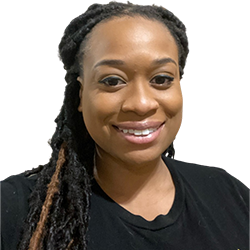Drawing a Blank?
Let me paint a picture for you.
You’ve just opened up a new document with little more than a vague idea of what you’ll write, and then stare down the blinking cursor on the otherwise empty page. As writers, we’ve all been there.
Let’s face it. It’s summertime, and for many of us, we’d love to be outside enjoying the nice weather… but instead, we just might be dealing with some writer’s block as we daydream of sunny days and tropical getaways. So how do you react when you’re drawing a blank and your brain has gone on vacation without you?
I’ll admit, once I wrote those first two paragraphs (and even though I knew what I was looking to write), I was drawing a blank on where to go next. Not exactly a ringing endorsement for a blog post about how to avoid that exact problem, huh?
Ok, back to the task at hand. How can we combat this mental fog?
Take Notes
There are certainly occasions when you know exactly what you want to say, but you don’t realize it because your thoughts are scrambled. However, if you just start typing whatever comes to mind, no matter how disorganized those words may be, you’ll likely find you have more to say can you initially realized.
Allowing yourself to document a “stream of consciousness” helps you to collect your thoughts, even if they seemingly don’t make sense in real-time. Of course, you may not use everything you type, but the end result will lead you to see everything “on paper” in a way that can help you manage your ideas in a more intentional way.
Look It Up
Is it possible that you’re struggling because you don’t know your subject matter in the way you need to? Or maybe it’s a topic you know incredibly well but haven’t dabbled in for a while, so it’s not fresh, and pertinent details aren’t top-of-mind. Even subject matter experts benefit from brushing up on their areas of expertise from time to time.
If you’re having trouble finding the best way to share your wisdom, the mental barrier could be fixed by something as simple as doing a bit more reading on the subject. Immersing yourself in the information can help put your mindset on your topic.
Taking the time to do a little extra groundwork to refresh your knowledge by looking at articles or resources could put you at ease when speaking or writing about your topic. It may also spark ideas you otherwise would only have thought of with that extra check-in.
Phone a Friend
I wrote a blog post a few months ago entitled “The Importance of Being a People-First Company” (check it out here if you missed it!). I knew the topic and details I wanted to include and had even written a lot of the content already, but I was struggling to come up with a compelling way to open the post. If nothing I wrote was holding my attention, how could I expect it to keep anyone else engaged?
I mentioned this to my friend and co-worker, Brielle. Almost immediately, she told me to lead off with “the potato story” (don’t worry – I’m not going to rehash that in this post, pun very much intended). The idea was perfect and exactly what I needed to start that post and tie together the other pieces within the document.
Don’t be afraid to ask someone else for an idea to steer you in the right direction. We’ve talked about this before, but a refresher never hurts – incorporating diverse thoughts can only help!
Let AI Point You in the (Write) Direction
In April, we shared a blog post about the emergence of artificial intelligence in the workplace and specifically how it can help writers.
I’d never recommend leaving all your creative writing up to AI, but asking it for a little inspiration can get you started. Using what AI comes up with and incorporating your own personal additions will give your work the human touch that can never come from relying solely on technology.
Step Away
Are you ever thiiiiiiiiis close to being done with a project, but realize you’ve been staring at it for so long that you no longer have any idea what it says? Or work on a jigsaw puzzle for days, only to get completely stumped when you have a handful of pieces left and somehow can’t figure out where the remaining ones go?
Sometimes the most productive thing to do is to stop. As long as deadlines allow for it, turn off your computer. Switch your attention to something else for the time being. Physically and mentally step away from the thing causing you trouble.
For me, when I don’t know where to go next with something, I give myself some time. That tactic can apply to any number of things, whether it’s struggling to find the right words while writing a blog post, thinking over strategy and logistics for a complex problem, or making a complicated decision (or sometimes even a simple one…we’ve all struggled to figure out what to have for dinner).
Normally, when I come back to whatever I was struggling with, I have a clearer mind and can point myself in the right direction to overcome whatever was holding me back.
Change Your Environment
If stepping away and returning to your same workspace didn’t do the trick, try bringing your work to a different environment. Whether you’re working from a sterile office building or the comfort of your couch, changing your surroundings often provides the inspiration you need.
If you’ve felt isolated in your work, look for a local coworking space so you can be around others. If your everyday desk area is eerily silent, head to a coffee shop for the day. On the flip side, if your usual workspace is too chaotic or noisy, consider going to a public or college library to regain your focus from a quieter place.
We often underestimate our environment’s impact on us because it’s normally familiar and comfortable. Switching it up from time to time is pretty simple and can be the exact inspiration our minds need to flourish.
Earlier, I suspected that my temporary lack of direction for what to write would make it difficult for an audience to take some of this insight to heart…a quick mental break and 1,000+ words later, and I’m thinking my assumption may have been short-sighted!
Next time you’re drawing a blank and need some inspiration, try the following:
- Taking Notes
- Looking It Up
- Phoning a Friend
- Asking for an Assist from AI
- Stepping Away
- Changing Your Environment
What are some of your techniques to help you get back on track when you’re drawing a blank?











